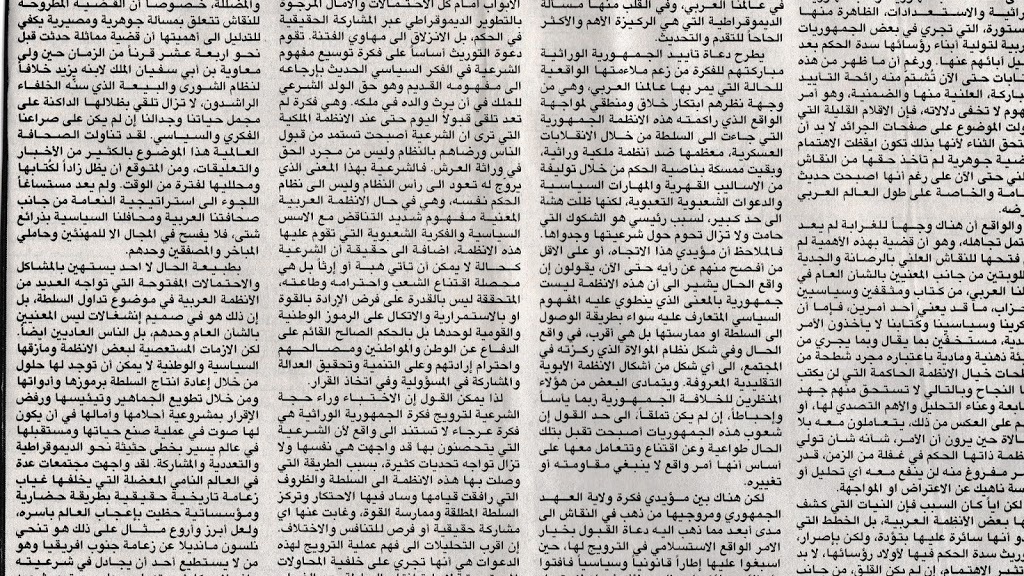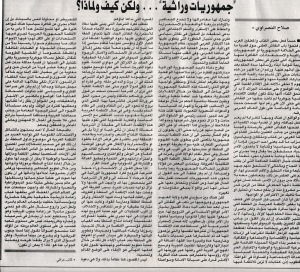Constitutional crisis in Iraqi Kurdistan
A dispute over the presidential elections may indicate that clouds are gathering over Iraqi Kurdistan, writes Salah Nasrawi
Plans put forward by the president of Iraq’s autonomous Kurdistan region, Masoud Barzani, for a referendum on a draft constitution have sparked criticisms that the veteran Kurdish leader is seeking a third term in office despite objections by opponents who say the controversial document imposes a two-term limit.
Barzani’s defiant move has also raised fears of a setback in the northern enclave that has been dubbed a paradise of political stability and economic growth in the sharply divided and violence-torn country.
On 23 May, Barzani announced that he would call for the referendum and accused the opposition of turning the issue into a political war. “If it’s a bad constitution, people are free not to approve it,” he declared to a huge, cheering crowd in Erbil, the Kurdistan provincial capital.
Opposition groups, however, were swift to blast Barzani’s suggestion.
The rising Change Movement, or Goran, and several Islamist parties demanded that the constitution be sent back to parliament for amendment before any referendum was held. Barzani’s long-term political ally, the Patriotic Union of Kurdistan (PUK) led by Iraqi President Jalal Talabani, also did not agree with the call for the referendum.
The Kurds have been enmeshed in internal wrangling over the elections after Barzani announced plans last month for balloting in provincial, parliamentary and presidential races in September.
The dispute centres around the right of Barzani himself to stand for election for a third term in office, despite the Kurdistan region’s draft constitution which stipulates in article 64 that the president of the Kurdistan region “may be re-elected for a second term as of the date this constitution enters into force”.
Barzani has not declared his candidacy, but his supporters argue that term limits are not retrospective, so Barzani, initially appointed by the Kurdish parliament in 2005, and re-elected by in a public vote four years later, is eligible for re-election. Barzani will complete his two terms in July.
The opposition accuses Barzani, whose Kurdistan Democratic Party (KDP) and family members have dominated Kurdish politics for more than half a century, of becoming increasingly authoritarian.
It argues that Barzani’s move is designed to circumvent the opposition’s efforts to reform Kurdistan’s political system and make it more democratic.
The draft constitution of the Kurdistan region was passed by the regional parliament in 2009, but the two parties, the KDP and the PUK, that share power over the region never put it to a referendum.
The opposition argues that the draft constitution was rushed through by the parliament at the time by a caretaker government that was controlled by the two ruling parties.
It also claims that some of the constitution’s articles were changed within a matter of days and presented for endorsement by the parliament while one third of its members were not present.
The opposition said that among the articles that were changed were those that made Iraqi Kurdistan region into a presidential system, whereas the document states in article 1 that the region enjoys “a parliamentary political system”.
Under the controversial draft constitution, the president wields absolute powers including the power to declare a state of emergency, issue decrees that have the force of law, dissolve the parliament and dismiss ministers.
Many of Barzani’s critics believe his insistence on holding a referendum has more to do with his autocratic tendencies and his intentions to stay in power for life than it does with any concern for democratic politics.
Now the wrangle is expected to deepen divisions between Barzani’s KDP and pro-democracy groups that have been trying to stifle Barzani’s overall control of the government and politics of the Kurdish region.
Since the uprising that took place in the Kurdish region following the defeat of former Iraqi president Saddam Hussein in the US-led Gulf War in 1991, the region has been ruled by Barzani’s KDP and Talabani’s PUK, though the two groups control two linguistically and politically diverse portions.
After the US-led invasion and occupation of Iraq in 2003, the Kurds were able to convert their regional government into a semi-independent federal region.
The two parties, which had fought each other intermittently, entered a strategic alliance to run a government that many Kurds criticise for being authoritarian and corrupt. Critics say that the two parties have been using the 111-member parliament as a mere rubber-stamp assembly for executive actions.
But Kurdistan’s political landscape has been changing since the latest elections in 2009 when the Goran List won a total of 25 seats, making it the second-most successful list in the elections after the ruling Kurdistan List.
Since then the party has displayed a broader show of defiance against the two-party rule, and it is now leading opposition to Barzani’s decision to put the draft constitution to a referendum.
However, it is uncertain whether Barzani and his party will take a step back, and he is more than likely to be his party’s candidate for president in the general elections due in September.
Indeed, Barzani is the dominant figure in Kurdistan, and his past shows that he will stop at nothing to keep himself, the KDP, and his family in power in the region.
His pressure to put the constitution to a referendum seems to be an attempt to mobilise the Kurdish street against the opposition by portraying it as undermining stability and prosperity in the region.
Yet many believe that by trying to humiliate the opposition by forcing the referendum Barzani may be taking a gamble too far that will awaken the long-stifled resentment felt by many Iraqi Kurds about his authoritarianism.
In fact, it could be said that the constitutional brinkmanship could mark a turning point in the almighty image of Barzani, proving his greed for power and his using of democracy for his own purposes.
In addition, his move will have far-reaching consequences for Kurdish national unity, and it will underscore deep splits at a time of great challenges for the Iraqi Kurdistan region.
The fact that the next elections are now on the rocks means that Barzani’s desire to remain president threatens the future of his party’s partnership with the PUK which for years has remained the bedrock for peace in Kurdistan.
The PUK has already announced that it will participate in the upcoming elections on separate lists, despite the fact that the two parties’ strategic alliance stipulates their participation in the local and national elections on the same list.
Barzani’s success in winning the referendum is far from guaranteed. If he loses the referendum, opposition to his rule will be stronger, and it will be unlikely that he can secure more power under the new constitution. This will likely deepen the crisis and heighten tensions in the region.
In 2011, protests against the two parties swept the Kurdish main cities in what was called the “Kurdish Spring” to rival the pro-democracy uprisings that toppled three Arab dictatorships.
The brutal crackdown on the peaceful demonstrations, which left ten people dead, then tarnished the image of Kurdistan as an emerging democracy.
Thus far, Kurdistan’s powerful leader has showed no sign of changing his mind, and he has used his assertive style and the common touch that courts the Kurdish populace to manipulate national politics.
These days, his rhetoric is all about his strained relations with Baghdad, with hints that the Kurds will seek full independence from the rest of Iraq if attempts to resolve disputes over oil and land fail.
On Monday, Barzani warned that the current round of talks with Baghdad that started last month marked the final opportunity to end the feud. He said that Kurdistan would be forced to seek a “new form of relationship” with the central government in Baghdad if no deal was reached.
Such blustering, apparently aimed at distracting attention, is unlikely to convince the Kurdish opposition to give way to Barzani. Given the determination of the opposition to oppose a new term for Barzani in office, a new spectre could haunt Kurdistan soon.









